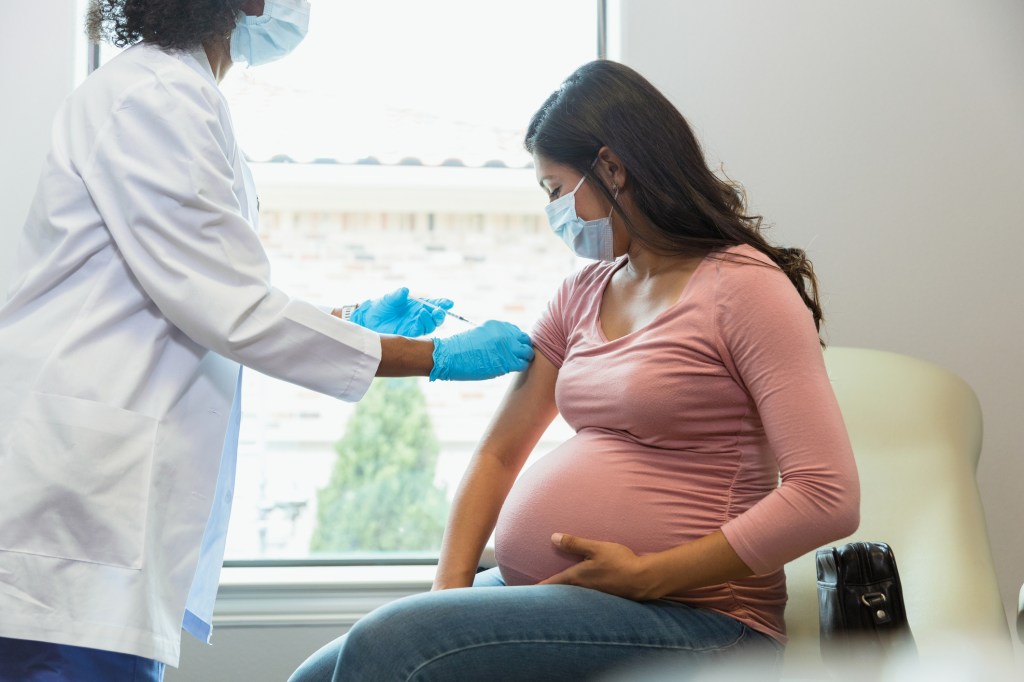Following the publication of a new research article on COVID-19 vaccination and pregnancy, a viral tweet with more than 28,000 views and accompanying Instagram repost are both calling into question the safety of COVID-19, Tdap, flu, and RSV vaccines for pregnant women.
The posts link to an article published on January 19, 2024, in MedPage Today discussing new findings on antibody levels in preterm and full-term infants whose mothers received the COVID-19 vaccine. Reporting on a newly published research article in JAMA Network Open, the piece explains that 10-fold higher antibody levels were found in the umbilical cord samples of women who received three doses of a mRNA COVID-19 vaccine when compared to those of women who received only two doses.
While some vaccines are not recommended for pregnant women, Tdap, Flu, and RSV do not pose a risk to fetal health. Moreover, a June 2023 meta-analysis “found no safety concerns for currently administered COVID-19 vaccines during pregnancy.”
According to the Centers for Disease Control and Prevention (CDC), vaccines that utilize live viruses—such as the measles, mumps, and rubella (MMR) and chickenpox vaccines—should not be administered to pregnant women. That’s because live viruses, even when their virulence is reduced in a vaccine, can theoretically cross the placenta and infect a fetus. However, immunization with vaccines using different methods have not been shown to harm the unborn and are often recommended to pregnant women. These alternate vaccine methods include inactivated (flu shot), toxoid (Tdap), viral vector (COVID-19), recombinant protein (hepatitis B, RSV), and messenger RNA (COVID-19) vaccines.
According to Dr. Paul Offit, a professor of pediatrics at the Children’s Hospital of Philadelphia, new vaccines are often initially contraindicated for pregnant women by the CDC because licensure trials do not usually directly assess that demographic. “Typically, when companies do vaccine trials, they often exclude pregnant women unless it’s a specific vaccine for pregnant women,” Offit told The Dispatch Fact Check.
Because pregnant women were much more likely to be hospitalized or die from COVID-19 than women of the same age who weren’t pregnant, and there were no serious concerns about additional vaccine risks during pregnancy, the CDC determined that pregnant women could choose to get the vaccine despite a lack of specific safety data. Women who chose to receive the vaccine were signed up for the V-safe monitoring system, which allowed the CDC to gather additional data on how the vaccines impacted pregnant women and the health of their babies. After additional evidence pointed toward high efficacy and no additional safety concerns, the CDC decided to more strongly recommend COVID-19 vaccination for pregnant women.
Because of the COVID-19 vaccines’ effectiveness at safely protecting both pregnant women and their babies from serious infections, the CDC, American College of Obstetricians and Gynecologists, Society for Maternal Fetal Medicine, and American Society for Reproductive Medicine all recommend that pregnant women receive a COVID-19 vaccine.
If you have a claim you would like to see us fact check, please send us an email at factcheck@thedispatch.com. If you would like to suggest a correction to this piece or any other Dispatch article, please email corrections@thedispatch.com.







Please note that we at The Dispatch hold ourselves, our work, and our commenters to a higher standard than other places on the internet. We welcome comments that foster genuine debate or discussion—including comments critical of us or our work—but responses that include ad hominem attacks on fellow Dispatch members or are intended to stoke fear and anger may be moderated.
With your membership, you only have the ability to comment on The Morning Dispatch articles. Consider upgrading to join the conversation everywhere.